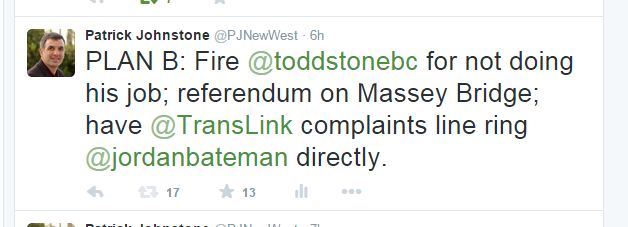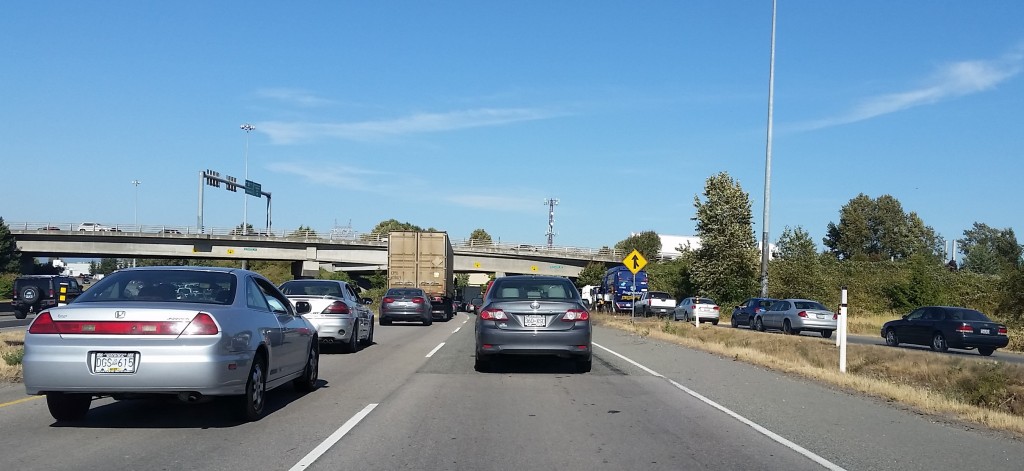My gut reaction after hearing the dismal Transportation and Transit Plebiscite TransLink Referendum results was summed up in this cheeky tweet:

I guess I should expand on that, given a few hours of sober thought.
1: This was the Province’s idea, and Todd Stone’s job was to make it happen. He is the Minister of Transportation for all of the Province, not just those suffering from left-lane bandits and oppressive speed limits. Everything about TransLink is provincial: the make-up of it’s Board, it’s enacting legislation, and the ultimate decision on funding. This is Todd Stone’s file, so if he is not accountable for the loss, who is? Realistically, when was the last time a Cabinet Minister in BC lost their job for not doing their job? Maybe it is time we brought accountability to the government that demands it from everyone else.
2: This Plan would have cost contributed to the local economy $7.5 Billion over the next 10 years, including the matching funds from senior governments and revenue increases related to new infrastructure. By comparison, the current debt load for the Port Mann Bridge is $3.6 Billion, and the traffic counts simply will not agree with those that project would require to pay that debt back. With the proposed tunnel replacement being just as wide, significantly longer, and with much more challenging geotechnical aspects, we can expect the Massey Replacement Bridge to be at least the same cost, for a crossing that sees less traffic than the Port Mann, and whose use is dropping. Having established (and reinforced) that the voters have a right to determine how Billions in transportation infrastructure is financed, clearly we will need to vote on this new $3 Billion + bridge.
3: Pissed off about SkyTrain reliability, accessibility, or even the cleanliness and security of the system? Disappointed because your bus is late again? Getting the bus service in your neighbourhood “optimized”, so now you have no way to get to your shift-work job without leasing a Hyundai? Sick and tired of cars queued up on your surface streets because people living in Maple Ridge or Langley have no viable option but to drive through New Westminster across a rickety old bridge every day? Don’t call your Mayor, don’t call the TransLink Complaints line, don’t write an angry letter to the local newspaper. Instead, contact Jordan Bateman and find out how our new regional leader will solve your troubles through tax cuts. His phone number is 604.999.3319. You could e-mail him at jbateman@taxpayer.com, but really, as a “Taxpayer”, you deserve to get your answers directly from him. Give him a call. Please pull over safely to shoulder before doing so.

Ugh.
In all seriousness, I thought the result would be closer. Up until the day, I thought 55% NO was the likely result. Of course, I expected New Westminster and Vancouver, with their large transit-dependent resident populations and (and just as important, but not as well represented) Transit-dependent businesses, would vote YES in the majority, and Burnaby would be close, only hurt by Mayor Corrigan’s temper-tantrum based approach to the situation. To see Maple Ridge go 25% was not a surprise, even their Mayor did not understand that this referendum was going to benefit them more than most communities, and thought a NO vote would somehow get them more buses. On the flip side, to see Bowen and Belcarra both so strongly Yes was a surprise. Maybe they recognize their single Community Shuttle services were high on the chopping list as the belt tightens on TransLink. Who knows.
But it was Richmond that shocked me the most. This City has, over the last 5 years, seen directly how transformative transit investment can be. The Canada Line is overcrowded after only a few years, and if anything is suffering from a lack of capacity and frequency, while a new City Centre of compact livable space booms around it. Semi-suburban office space is becoming vacant as businesses want to move closer to frequent transit. In 2015, Richmond is a Transit Success Story, yet only the comparative transit deserts of Langley and Maple Ridge turned fewer YES votes. It defies logic.
It is too early to guess what happens next. I speculated earlier (and only the most cynical parts of that are already coming true. See: Jordan Bateman). But with the Premier not providing any media contact, and the Minister only saying that everyone else has to smarten up, we are entering uncertain territory.
I will make one quick comment on a common speculation out there: “Property Tax” will not be the solution. After what we just went through, I cannot imagine a majority of Mayors will come together to agree on a Property Tax formula to raise the $250M/year. Can you imagine the Mayor of West Vancouver (already the highest taxes in the region) agreeing to increase his property taxes to support a plan 56% of his voters said NO to? Or Richmond at 72% NO? Even in Maple Ridge and Langley who have the lowest property values, and therefore would presumably face the least relative burden, while having the most need, there is no Mayor dumb enough to suggest it is time to invest in TransLink. You expect Corrigan to step up now? Calculating a Property Tax formula that is fair, equitable, and provides the stable funding that transit expansion requires is a monumental task. So I would be surprised if a “property tax”-based solution was found any time soon.
The Plan included discussion of a comprehensive regional road-pricing initiative. This will be no less complicated, and politically very prickly (which, in our new reality, means that Jordan Bateman is going to hate it – “Taxpayers paying for what they use!? What about the WASTE!”), but in the long run, it is the most logical public policy. Admittedly, I have no idea how we get there from here, though.
At best, that is several years off, and in the meantime, expect your property taxes to go up anyway. Roads, parking and congestion cost cities a lot of money. Providing, maintaining, and policing expanded asphalt will only get more expensive. With the regional situation in such flux, it is important that we continue assuring our local roads and sidewalks are as safe, accessible, and efficient as can be. As for the rest… that story has yet to be told.
Although an equally complicated and far off solution, what about advocating for a model of regional government similar to the old Metro Toronto? It has the advantage of offloading a lot of the responsibility from the Province to the Metro government and allows for much stronger regional governance.